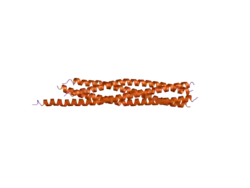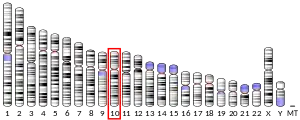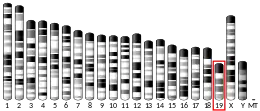VTI1A
Vesicle transport through interaction with t-SNAREs homolog 1A is a protein that in humans is encoded by the VTI1A gene.[5][6]
The protein encoded by the VTI1A gene is a vesicular-SNARE (v-SNARE) protein which is located in the membranes of target vesicle compartments.[7]
References
- GRCh38: Ensembl release 89: ENSG00000151532 - Ensembl, May 2017
- GRCm38: Ensembl release 89: ENSMUSG00000024983 - Ensembl, May 2017
- "Human PubMed Reference:". National Center for Biotechnology Information, U.S. National Library of Medicine.
- "Mouse PubMed Reference:". National Center for Biotechnology Information, U.S. National Library of Medicine.
- "Entrez Gene: vesicle transport through interaction with t-SNAREs homolog 1A (yeast)".
- Fischer von Mollard G, Stevens TH (January 1998). "A human homolog can functionally replace the yeast vesicle-associated SNARE Vti1p in two vesicle transport pathways". J. Biol. Chem. 273 (5): 2624–30. doi:10.1074/jbc.273.5.2624. PMID 9446565.
- "VTI1A vesicle transport through interaction with t-SNAREs 1A [Homo sapiens (Human)] - Gene - NCBI".
Further reading
- Luke MM, O'Meara ES, Rowland CM, et al. (2009). "Gene Variants Associated With Ischemic Stroke: The Cardiovascular Health Study". Stroke. 40 (2): 363–8. doi:10.1161/STROKEAHA.108.521328. PMC 2881155. PMID 19023099.
- Gerhard DS, Wagner L, Feingold EA, et al. (2004). "The Status, Quality, and Expansion of the NIH Full-Length cDNA Project: The Mammalian Gene Collection (MGC)". Genome Res. 14 (10B): 2121–7. doi:10.1101/gr.2596504. PMC 528928. PMID 15489334.
- Grupe A, Li Y, Rowland C, et al. (2006). "A Scan of Chromosome 10 Identifies a Novel Locus Showing Strong Association with Late-Onset Alzheimer Disease". Am. J. Hum. Genet. 78 (1): 78–88. doi:10.1086/498851. PMC 1380225. PMID 16385451.
- Mallard F, Tang BL, Galli T, et al. (2002). "Early/recycling endosomes-to-TGN transport involves two SNARE complexes and a Rab6 isoform". J. Cell Biol. 156 (4): 653–64. doi:10.1083/jcb.200110081. PMC 2174079. PMID 11839770.
- Shiffman D, O'Meara ES, Bare LA, et al. (2008). "Association of Gene Variants with Incident Myocardial Infarction in the Cardiovascular Health Study". Arterioscler. Thromb. Vasc. Biol. 28 (1): 173–9. doi:10.1161/ATVBAHA.107.153981. PMC 2636623. PMID 17975119.
- Kimura K, Wakamatsu A, Suzuki Y, et al. (2006). "Diversification of transcriptional modulation: Large-scale identification and characterization of putative alternative promoters of human genes". Genome Res. 16 (1): 55–65. doi:10.1101/gr.4039406. PMC 1356129. PMID 16344560.
- Strausberg RL, Feingold EA, Grouse LH, et al. (2002). "Generation and initial analysis of more than 15,000 full-length human and mouse cDNA sequences". Proc. Natl. Acad. Sci. U.S.A. 99 (26): 16899–903. Bibcode:2002PNAS...9916899M. doi:10.1073/pnas.242603899. PMC 139241. PMID 12477932.
- Flowerdew SE, Burgoyne RD (2009). "A VAMP7/Vti1a SNARE complex distinguishes a non-conventional traffic route to the cell surface used by KChIP1 and Kv4 potassium channels". Biochem. J. 418 (3): 529–40. doi:10.1042/BJ20081736. PMC 2650881. PMID 19138172.
- Tai G, Lu L, Wang TL, et al. (2004). "Participation of the Syntaxin 5/Ykt6/GS28/GS15 SNARE Complex in Transport from the Early/Recycling Endosome to the Trans-Golgi Network". Mol. Biol. Cell. 15 (9): 4011–22. doi:10.1091/mbc.E03-12-0876. PMC 515336. PMID 15215310.
- Antonin W, Holroyd C, Fasshauer D, et al. (2000). "A SNARE complex mediating fusion of late endosomes defines conserved properties of SNARE structure and function". EMBO J. 19 (23): 6453–64. doi:10.1093/emboj/19.23.6453. PMC 305878. PMID 11101518.
This article is issued from Wikipedia. The text is licensed under Creative Commons - Attribution - Sharealike. Additional terms may apply for the media files.





![1vcs: Solution Structure of RSGI RUH-009, an N-Terminal Domain of Vti1a [Mus musculus]](../I/PDB_1vcs_EBI.jpg.webp)